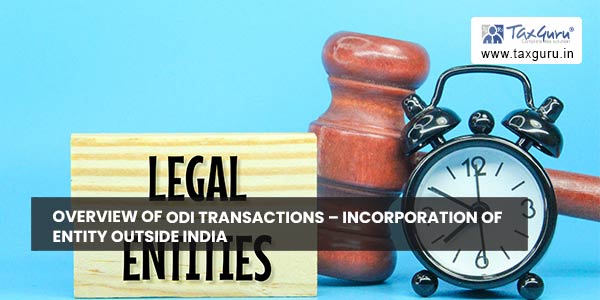Prima facie Stipulation/conditions for incorporating a Wholly owned subsidiary outside India by an Indian Party (IP):
Under Automatic Route:
As specified in regulation 6(2):
1. The Financial Commitment in JV/WOS entity shall not exceed 400% of the net worth of the company as per the latest audited balance sheet of the Indian Party or USD 1 billion whichever is lower. (Unutilised net worth of Subsidiary/ies shall be clubbed).
With effect from July 03, 2014, it has been decided that any financial commitment (FC) exceeding USD 1 (one) billion (or its equivalent) in a financial year would require prior approval of the Reserve Bank even when the total FC of the Indian Party is within the eligible limit under the automatic route (i.e., within 400% of the net worth as per the last audited balance sheet).
Thus, any Financial Commitment exceeding USD 1 (one) billion shall be under approval route only.
Financial commitment means the amount of direct investment by way of contribution to equity, loan and 100 per cent of the amount of guarantees and 50 per cent of the performance guarantees issued by an Indian party to or on behalf of its overseas Joint Venture Company or Wholly Owned Subsidiary;
Note :Bankers generally accepts Raloo rate for computing such limits for ODI.
2. The JV/WOS must be engaged in bonafide business activity, there are no sector wise prohibition unlike FDI transactions except for Real estate and banking business which faces some extra restrictions & prohibitions with respect to overseas direct investment. Actually ODI by Indian Party engaged in financial service sector are governed by a separate Regulation 7 read other applicable laws and regulations as updated from time to time. Real estate business means buying and selling of real estate or trading in Transferable Development Rights (TDRs) but does not include development of townships, construction of residential/commercial premises, roads or bridges.
3. The Indian Party is not on RBI’s caution list/list of defaulters or under any investigation by any investigation, enforcement or regulatory body.
4. The Indian Party has submitted Annual performance report with respect to all of its overseas investment in form ODI part III.
5. The Indian Party routes all transaction relating to investment in a JV/WOS through one branch of AD bank only. Different branches may be chosen for different Overseas investment i.e. for different JV/WOS
6. The Indian Party files ODI part I duly completed to the designated branch of Authorised dealer.
7. Sources for such ODI transactions can be following:
a. Out of balances in EEFC account of Indian party maintained with AD bank.
b. Drawal of foreign exchange from AD bank – it can’t exceed 100% of net worth of Indian party.
c. Amount raised by ADR/GDRs by Indian banks
d. ECB
e. Stock swaps etc.
Note: The ceiling specified in point 1 doesn’t apply for funding a and c sources.
8. The IP may extend a loan or guarantee to or behalf of JV /WOS within the permissible financial commitment, provided that the Indian Party has already made investment by way of contribution to the equity capital of the Joint Venture/Wholly Owned Subsidiary. Therefore Unless Initial relationship is established no other forms of financial commitments are feasible.
9. Valuation is mandatory in case of investment in existing company outside India. In case of investment is more than 5 million USD and share swap transactions by Cat. -1 Merchant banker registered with SEBI or an investment banker registered with appropriate regulatory authority in host country. In all other cases by CA or CPA.
10. Direct Investments are not allowed in an overseas entity located in countries identified by FATF as “Non-Co-operative” like North Korea etc. Investment in Pakistan is allowed through approval route only, irrespective of quantum and source of funding.
11. Only Indian Party is eligible for ODI under automatic routes. Definition includes company incorporated in India.
Note: on Pre-Incorporation expenses:
For meeting Incorporation expenses:
1. If host country stipulates that all investments in overseas entity shall be through FCA only, then the Indian entity Shall Open Such account. However, Funds lying in this account can be utilized only for sake of investment in Overseas JV/WOS, therefore we need not to obtain Clarification/Permission from AD branch for its utilization for meeting Pre-Incorporation expenses of the Overseas JV/WOS. It will be Prudent if a Confirmation as to the same that Such Utilization of the funds lying In FCA for Pre- Incorporation expenses is deemed as investment in Overseas JV/WOS is obtained.
The Indian Party should submit the details of debits and credits in the FCA on yearly basis to the designated AD bank with a certificate from the Statutory Auditors of the Indian party certifying that the FCA was maintained as per the host country laws and the extant FEMA regulations / provisions as applicable.
2. If the host country doesn’t stipulates that all investments in overseas entity shall be through FCA only, then Seek AD Bank’s advice for Source and Remittance route for incurring such Pre-Incorporation expenses, if they resolve this issue then the very purpose is served, else mail to RBI ( helpoid@rbi.org.in) with AD bank in cc & seek their advice for the same. Alternatively, AD branch can directly contact to the Office of The Chief General Manager, Reserve Bank of India, Foreign Exchange Department, Overseas Investment Division.
Note: If shares are issued against capitalisation of Pre incorporation expenses -form ODI shall be filed for such receipt- foreign security receipt i.e. the ODI transaction. Attached is the case of where pre incorporation expenses are capitalised but no form ODI is filed, which resulted in the penal action.
Prima facie it seems that unlike for FDI there are no cap of 5% capital or USD 0.5 million on capitalisation of Pre incorporation expenses.
Post Incorporation compliance under Regulation 15 are as under:
An Indian Party will have to comply with the following: –
1. Receive share certificates or any other documentary evidence of investment in the foreign JV / WOS as an evidence of investment and submit the same (a copy of the same) to the designated AD within 6 months;
2. Repatriate to India, all dues receivable from the foreign JV / WOS, like dividend, royalty, technical fees etc with in 60 days of its falling due.
3. Submit to the Reserve Bank through the designated Authorized Dealer, every year, an Annual Performance Report in Part III of Form ODI in respect of each JV or WOS outside India set up or acquired by the Indian party.
4. Report the details of the decisions taken by a JV/WOS regarding diversification of its activities /setting up of step-down subsidiaries/alteration in its share holding pattern within 30 days of the approval of those decisions by the competent authority concerned of such JV/WOS in terms of the local laws of the host country. These are also, to be included in the relevant Annual Performance Report; and

5. In case of disinvestment, sale proceeds of shares/securities shall be repatriated to India immediately on receipt thereof and in any case not later than 90 days from the date of sale of the shares /securities and documentary evidence to this effect shall be submitted to the Reserve Bank through the designated Authorised Dealer.
6. The FCA so opened shall be closed immediately or within 30 days from the date of disinvestment from JV / WOS or cessation thereof.
7. Reserve Bank will allot a Unique Identification Number for each Joint Venture or Wholly Owned Subsidiary outside India and the Indian Party shall quote such number in all its communications and reports to the Reserve Bank and the authorized dealer.
Sources for above specified assertions FEM (Transfer or Issue of any Security) Regulations, 2004 as amended from time to time and Master Direction – Direct Investment by Residents in Joint Venture (JV) / Wholly Owned Subsidiary (WOS) Abroad.
Please note that it has been decided to rationalize the existing provisions governing overseas investment. The draft Rules and Regulations will be finalized after public consultations. Below is the Link to View these draft regulations.
https://www.rbi.org.in/Scripts/BS_PressReleaseDisplay.aspx?prid=52026
*****
DISCLAIMER: Above cited wordings represents only academic views of Author and is not a professional advice by him in any manner and he bears no responsibility for any implications basis this write up. The Author is a member of ICSI but views expressed above has no relationship with ICSI. It doesn’t represents views of ICSI. It doesn’t constitutes any advice or any suggestion for any transaction or business processes etc. The readers are advised to refer applicable laws for the same or seek professional advice.






Good Job Ravi.